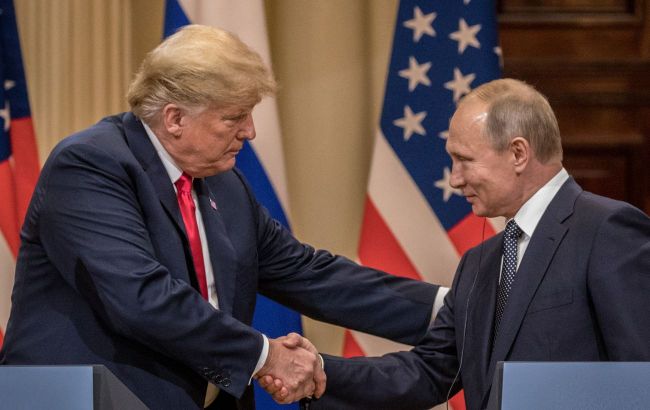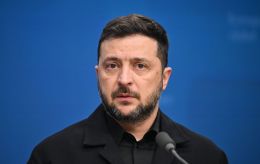Price of loyalty: What Putin offering Trump to keep quiet
 Russia may interest the United States in participating in joint business projects (photo: GettyImages)
Russia may interest the United States in participating in joint business projects (photo: GettyImages)
Political analyst Abbas Gallyamov analyzes whether Putin is ready to end wars and why Trump does not put any pressure on Russia in his column for RBC-Ukraine.
What is Putin's plan?
Putin still believes that he can achieve a certain advantage in the war against Ukraine by military means. Therefore, he does not want to move towards a political settlement. But at the same time, he has a serious problem — Donald Trump, who wants the war to end. Quarrelling with Trump is completely counterproductive for Russia, and Putin cannot afford it.
Firstly, because it is no longer 2022, but 2025. His belief in the unlimited capabilities of the Russian army has, to put it mildly, been shaken. Over the past three years, Putin has repeatedly seen Russian troops not only unable to advance but simply retreating, sometimes even in panic.
Faith in the stability of the Russian economy has also weakened. And so only fools can now claim that sanctions are beneficial to Russia. The prospect of new sanctions or increased supplies of American weapons to Ukraine greatly frightens Putin.
And he has found a solution to this dilemma. Putin is buying time from Trump. The formula time is money in relations between Putin and Trump has become a reality. Putin is tempting Trump with a large number of lucrative offers in various areas of Russian-American relations, except Ukraine. It looks something like this: "You give in to me on Ukraine, and I'll give in to you, for example, on Iran, in the Middle East in general, and maybe we can agree on China too." And even on business proposals.
How Russia could bribe US
Following the meetings and negotiations between Kirill Dmitriev and Steve Witkoff, at least three major US-Russian projects have already been agreed upon and are at an advanced stage of preparation. This is a leak from the Kremlin apparatus. A fairly wide circle of people involved in the development and elaboration of details is involved in this issue.
The first project is the trade of Russian gas in Europe. The idea is that the US will buy gas on the Russian exchange at domestic Russian prices, transport it through Russian pipelines to Europe, and sell it there at European prices. However, the gas will be considered American because it was purchased by Americans. And all the profits will go to the US. Chevron has been agreed upon as the operator of this project.
The second project involves three oil refineries in Germany, in which Rosneft has a stake. These shares are likely to be transferred to Chevron at an extremely favorable price.
The third project concerns Vostok Oil, which was once launched by Rosneft to extract oil and associated gas condensates in the north, in the Taymyr Peninsula area. The cooperation involves the supply of oil equipment from Chevron, Halliburton, and several other smaller American companies. And Russia, represented by Rosneft, will pay them with crude oil, which will again end up on world markets as American oil. Moreover, the exchange rate — how much equipment for how much oil — will be extremely favorable for the US.
These three projects are in their final stages. But in fact, there are more such projects. These include the extraction of rare earth metals, titanium, gold, and cooperation in nuclear energy.
They are being prepared by a large number of people in ministries, state-owned companies: Gazprom, Rosneft, Rosatom, Polyus Gold. Rotenberg and Tokarev from Transneft are also preparing their proposals. All of this goes through the government and ends up with Maksim Oreshkin, the deputy head of the Presidential Administration for Economic Affairs. Then it goes to Dmitriev, and then to the Americans. Witkoff's last visit to Putin was about this cooperation.
I am not going to claim that this is corruption in its purest form and that Trump is pocketing this money. I have no reason to believe this, although I cannot completely rule it out either. But even if he doesn't take anything personally, it's still a lucrative proposition, because we're talking about profits for American businesses, which pay taxes, fill the budget, and create jobs. And that's exactly what Trump promises his voters.
Trump could have acted differently
The picture of the relationship between Putin and Trump might look like this: Putin says to Trump, "I hear you, you want peace, but I want to fight a little longer. Let's not rush, and I'll offer you these bonuses." And the US president, judging by the results of the latest negotiations, agreed. After all, he did not use the leverage he had.
Theoretically, he could have submitted a bill to Congress — a few days before the negotiations — on a sharp increase in military aid to Ukraine and the introduction of new sanctions against Russia, conditionally from June 15, with a delayed entry into force — for the duration of the truce and until the complete cessation of hostilities.
As it turned out, Putin wants to continue his offensive, and the price for him has not increased. If Trump had taken a tougher stance, the price for Putin would have skyrocketed. He would have had to think carefully: Is it worth continuing the war? Instead, he is now thinking: "Even if it doesn't work out and I lose a bunch of people again, what if I get lucky?"
Let me remind you that Americans themselves rated the effectiveness of sanctions imposed on Russia at only 3 out of 10. The effect could have been significantly enhanced by providing additional weapons to Ukraine. Then, Putin would have had an incentive for a truce, restraint, and negotiations.
But Trump did not do this. So, given the levers available to him and his unwillingness to use them, he is satisfied with what he got from Putin. I am not saying that Trump will not decide to apply pressure later, in a month or six months. He still has that option.
I am not saying that Putin has bought Trump. People like Trump cannot be sold. But we can confidently say that there will be a certain delay.
About negotiations in Istanbul
The negotiations in Istanbul are a ritual that Russia must adhere to to maintain its image in front of Trump. After all, it's not just about business and projects. Trump is not only a businessman, but also a showman. He needs everything to look beautiful and convincing. That is why the rhetoric of the Russian leadership is now changing.
I assume that even after launching a new offensive, Putin will continue to describe events not in terms of victory but as a search for compromise, as he did immediately after his conversation with Trump. When he appeared before the press, he stated for the first time that Russia and Ukraine must find compromises that suit both sides. Although it was this very person who openly spoke in 2022 about the destruction of Ukrainian statehood.
Another example: Putin did not send Lavrov, who provokes conflicts with or without reason, to the negotiations. He sent Medinsky, an opposite character. If he is given the command to push, he will push. But if it is not necessary, he will behave cautiously. Lavrov, in this case, would simply have disrupted the negotiations.
A telling moment: after the negotiations, Medinsky said that the parties had agreed to present their ideas on a temporary ceasefire to each other and continue working. In other words, he decided to show that the decision was not buried. Although it had not been reached. Lavrov would have said that Ukraine had ruined everything and that there could be no ceasefire. That is the difference.
Therefore, the very choice of communication style in favor of such a flexible player as Medinsky indicates that Putin has accepted the new rules of the game regarding softening rhetoric. In exchange for this and business deals with Iran and China, he hopes that Trump will not pressure him or rush him into peace in Ukraine.

